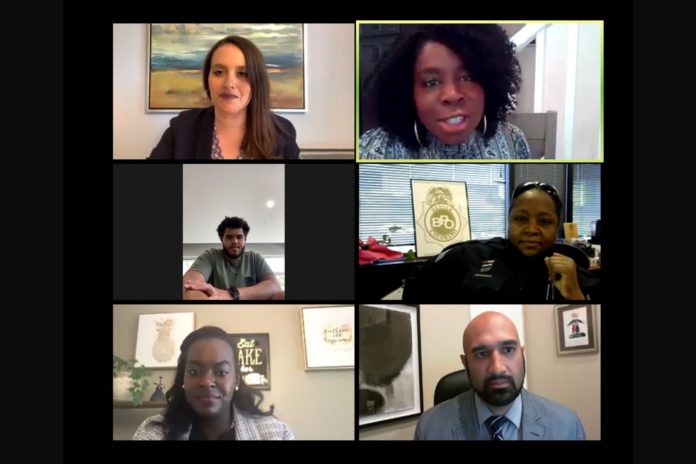
The Center for Legal Inclusiveness on May 20 held a talk to mark the anniversary of the murder of George Floyd and reflect on the Black Lives Matter movement. The discussion, which addressed racism in policing and prosecution and the limits of recent police and criminal justice reform legislation, was a follow-up to a CLI town hall held last year.
The event was moderated by Sara Scott, CEO of CLI; April Jones, Sam Cary Bar Association president and CEO and founder of Jones Law Firm. Panelists included LaQunya Baker of Baker Simpson Law, Sgt. Carla Havard of the Denver Police Department and Qusair Mohamedbhai, partner and founder of Rathod Mohamedbhai.
First to speak were Mohamedbhai and his client, Barry Wesley, a Black student and football player at Colorado State University. They discussed how, wWhile selling roofing in Loveland last summer, Wesley was attacked by a heavily armed white man who forced him to the ground, knelt on the back of his neck and pointed a gun at him.
The white man, Scott Gudmundsen, a former Utah police officer, accused Wesley and his coworker of being members of “antifa.” Sports Illustrated reported in August that Gudmundsen had also accosted Wesley the day before and later phoned Wesley’s supervisor to say he didn’t want “antifa, or Mexicans or big Black guys” in his neighborhood.
Gudmundsen phoned the police and reported he had confronted antifa members in his neighborhood. Wesley told Sports Illustrated that while he was begging for his life, Gudmundsen said that he wasn’t going to kill him — the police would do that for him. However, when the police arrived, Mohamedbhai said, they “figured out very quickly what was going on” and turned their guns on Gudmundsen.
Gudmundsen was arrested and charged with felony menacing, false imprisonment, impersonating a police officer and prohibited use of a weapon. But “we couldn’t convince the white DA that this was a hate crime,” Mohamedbhai said. Gudmundsen eventually pleaded guilty to the menacing charges as part of a plea agreement that allowed him to avoid prison.
“I felt like I was failed,” Wesley said of his experience with the prosecutors and justice system. “I felt like they failed me. It was just another case — it wasn’t anything special. It was just like, ‘oh, can we just tuck this under the rug?’”
“The judge herself was extremely frustrated,” Mohamedbhai said. “When we filed the motion to compel prosecution of the hate crime charges, she herself said, ‘Well, this feels like a hate crime.’” But there wasn’t much the judge could do to affect the charging decisions of the DA. “This was just yet another example of the criminal justice system failing people of color,” Mohamedbhai said.
The Pendulum of ‘Progress’
Mohamedbhai said that Wesley plans to bring his story to the General Assembly, “and we’re going to try to sort out this hate crime statute.” But he said that while the legislature is making incremental progress in criminal justice and police reform, including a pending bill to limit the use of ketamine by first responders, he wouldn’t say he’s “excited” by the changes.
“I think it’s difficult to get excited about the legislation,” agreed Baker, a criminal defense attorney. “We get pretty far and we’re thinking it’s progress, but we forget that it comes slapping back at us a lot of the time.”
Baker said that last year’s police reform bill hasn’t had any effect on her own practice. That bill required law enforcement to wear body cameras and report data, changed the rules on the use of deadly force and eliminated the qualified immunity defense for local law enforcement officers. “Has that stopped the over-incarceration of Black and brown folks? Has that stopped over-policing and overcharging?” she said. “Absolutely not.”
However, Baker said she was pleased the state repealed the death penalty last year. Another bright spot has been a bill to reduce sentences for felony murder, which was signed into law last month. There are other bills in the pipeline “that need to get through,” she added, including SB21-273, a pre-trial reform bill that would require officers to issue a summons for, rather than arrest, defendants charged with low-level offenses. And she hopes to see a DA accountability bill next session. “But like I said, that pendulum is always swinging, so I’m not holding my breath,” Baker said.
Inside the Machine
Havard, who is president of the Black Police Officers Organization, said she is “not surprised at all” by what Wesley went through. “This is a uniform. When I take this off, I’m like everybody else,” she said. “Sometimes when it’s on I’m like everybody else.”
Havard said the institution of policing is “rooted in racism and control” and “certainly wasn’t formulated to include us.” But that’s why “more and more people need to get inside of this machine,” she said, “so we can hopefully dismantle it as much as we can.”
Havard said that Denver’s leadership has been “really progressive in policing” when it comes to changing policies to reflect best practices, such as requiring the use of body cameras and working with the Center for Policing Equity on anti-bias training.
But she expressed skepticism about recent efforts to diversify the police union, which she said is all white men. “I’m happy that that’s happening,” Havard said, but “I’m almost offended that it took a 2020 year to make you have this epiphany. And then also, because I have trust issues, I wonder: Is it legitimate and authentic?”
“You can’t be the oppressor and then come in and now I need to … see you as the savior. And that’s what they’re trying to do,” she said. “So, I’m going to try to keep them legitimate as much as I can.”

